 Amit Khare,
Amit Khare,
Joint Secretary, Ministry of Human Resource Development,Government of India
The wealth of nations is judged by the intellectual property they have and not by their physical or mineral wealth. There is a need for integration of societies and countries. We may have manufacturing in one place, the user maybe at another place, and the workforce maybe coming from a separate country. This means, whatever education and skill development we wish to have must be of comparable standards and be such that it can be trans-located from one region to another.
 Dr Ashwini Kumar Sharma, Dr Ashwini Kumar Sharma,Managing Director,National Institute of Electronics and Information Technology(NIELIT) Digital literacy is very important in today’s world. Also, mobile penetration is growing. So, we have to plan for e-content for the mobiles because that’s the best component through which we can reach the last miles. With increased internet connectivity, I also believe that we have to go for a virtual classroom system, as we have shortage of quality teachers. Lastly, to enhance employability we have to focus on skill development. |
 Vimal Wakhlu, Vimal Wakhlu,Chairman & Managing Director,Telecommunications Consultants India LimitedEducation is a great enabler as well as leveller. We have worked with former President APJ Abdul Kalam’s Pan-African e-Network project. It is one of the most successful projects where 10,000 students from 48 countries across Africa are enrolled in live, face-to-face classroom sessions. As we have seen from Pan-African model, there is a lot of potential for cooperation at the global level in terms of sharing of knowledge, content development, increasing accessibility, and improvisation of technology for e-networks. |
 Dr Akhilesh Gupta,
Dr Akhilesh Gupta,
Secretary, University Grants Commission
The Government of India’s investment in research is roughly 0.95 percent of the GDP, and it aims to increase this to two percent by the end of this plan period. We are working on the Singh-Obama Knowledge Initiative, and working for collaborations between foreign and Indian universities for the purpose of research and innovation.
 Dr S S Jena,
Dr S S Jena,
Chairman, National Institute of Open Schooling
Globally, the open learning education resources have gained a great momentum and we must pace ourselves with this particular approach for improving quality in education. We have to create a safety net for the disadvantaged groups or school dropouts so that they complete their education up to secondary level. We should collaborate and develop good quality resources that will be available at a particular platform.







 “Excellence in education has become a buzzword today, and is very often
“Excellence in education has become a buzzword today, and is very often

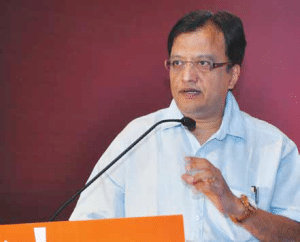 Prof (Dr) S S Mantha,
Prof (Dr) S S Mantha, Prof Parvin Sinclair,
Prof Parvin Sinclair, Alisher Umarov,
Alisher Umarov,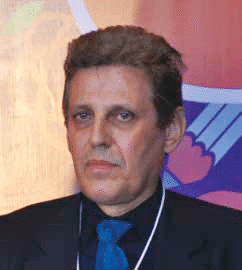 Dr Pascal Chazot,
Dr Pascal Chazot, Education by itself is a great equaliser of life, but it is through the use of ICT that we can enable a larger cross-section of society to gain access to quality education. Now the HRD Ministry, in association with the Ministry of External Affairs, is planning to use online systems for helping Indian students and researchers in universities abroad. Unfortunately, there has been a significant rise in instances of racial attacks and fake universities duping Indian students studying abroad. So the HRD Ministry wants to ensure that there is help at hand for those falling prey to such scandals.
Education by itself is a great equaliser of life, but it is through the use of ICT that we can enable a larger cross-section of society to gain access to quality education. Now the HRD Ministry, in association with the Ministry of External Affairs, is planning to use online systems for helping Indian students and researchers in universities abroad. Unfortunately, there has been a significant rise in instances of racial attacks and fake universities duping Indian students studying abroad. So the HRD Ministry wants to ensure that there is help at hand for those falling prey to such scandals.
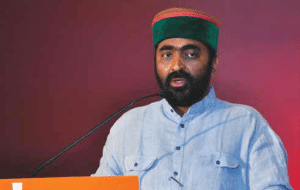 Shri Mantriprasad Naithani
Shri Mantriprasad Naithani
 To bring about excellence, commercialisation of education needs to be stopped first. Educationists and education aid providers need to work together on areas of improvement through deliberations and innovations. Enrolments need to be increased, while dropout rates have to be minimised. Language barriers play a vital role too.
To bring about excellence, commercialisation of education needs to be stopped first. Educationists and education aid providers need to work together on areas of improvement through deliberations and innovations. Enrolments need to be increased, while dropout rates have to be minimised. Language barriers play a vital role too. A lot of transformational practices can come into examinations that will improve the overall quality of the education system. Maybe five years down the line, we shall be talking more about the best practices in computerbased
A lot of transformational practices can come into examinations that will improve the overall quality of the education system. Maybe five years down the line, we shall be talking more about the best practices in computerbased The issue of ensuring quality in education is inherently tied to the scalability and accessibility of education. We need larger number of classrooms, books, study materials, labs, equipments, and good teachers, etc. However, human resources cannot be guaranteed to scale, and that’s where blended learning can help through models such as flipped classrooms and distance education. It enables students to get a mix of face-to-face type interaction with teachers and computer-mediated learning technologies, hence offering them best of both the worlds.
The issue of ensuring quality in education is inherently tied to the scalability and accessibility of education. We need larger number of classrooms, books, study materials, labs, equipments, and good teachers, etc. However, human resources cannot be guaranteed to scale, and that’s where blended learning can help through models such as flipped classrooms and distance education. It enables students to get a mix of face-to-face type interaction with teachers and computer-mediated learning technologies, hence offering them best of both the worlds. We need to create a framework where a student’s selflearning process gets much better. Technology is not about taking the teacher out of the system, but enabling the teacher. We need to change the mindset and see technology as an enabler. For any transformation to happen, we need corporates to provide us technology that would take us to the next level, academicians for bringing in research and innovation, and parents to keep faith in us.
We need to create a framework where a student’s selflearning process gets much better. Technology is not about taking the teacher out of the system, but enabling the teacher. We need to change the mindset and see technology as an enabler. For any transformation to happen, we need corporates to provide us technology that would take us to the next level, academicians for bringing in research and innovation, and parents to keep faith in us. The classroom should focus on how we can learn together. This is the age of diminishing IP. The idea of patents is going to be over, because everything is going to be open. We are talking about ethical hacking. We really need to open up.
The classroom should focus on how we can learn together. This is the age of diminishing IP. The idea of patents is going to be over, because everything is going to be open. We are talking about ethical hacking. We really need to open up. One of the most important thing that I tried to identify is availability of teachers. Across India there is a dearth of teachers and according to reports we require 1.2 million teachers. The main reason for this, as per reports, is that teaching is the least preferred career choice. Another reason is the insufficient teacher training institutions and lack of qualified teacher educators.
One of the most important thing that I tried to identify is availability of teachers. Across India there is a dearth of teachers and according to reports we require 1.2 million teachers. The main reason for this, as per reports, is that teaching is the least preferred career choice. Another reason is the insufficient teacher training institutions and lack of qualified teacher educators. The passion for teaching is lacking in the country. There is a huge gap beetween how the classes are held in India and abroad. The problem is either we have 18th century classrooms or we have 22nd century classrooms in most of the international schools, and we have 20th century teachers and 21st century students. To solve the problem we need to focus on quality teachers. The whole concept of education is a waste if teachers, the most important factor for student development, are not paid attention to.
The passion for teaching is lacking in the country. There is a huge gap beetween how the classes are held in India and abroad. The problem is either we have 18th century classrooms or we have 22nd century classrooms in most of the international schools, and we have 20th century teachers and 21st century students. To solve the problem we need to focus on quality teachers. The whole concept of education is a waste if teachers, the most important factor for student development, are not paid attention to. You have to inspire children and create in them a desire to learn, not just rote learn. They should be able to discuss and have belief in values and should have confidence in themselves. We should give them a stable tomorrow with informed decisions. But are we training our teachers to do that? There are large percentage of teachers who are unaware of what they need to do for a better future of young children. It is teacher training component that is going to make a critical difference. Teachers today have to act as facilitators and turn into mentor. For achieving that teachers should become a life-long learners.
You have to inspire children and create in them a desire to learn, not just rote learn. They should be able to discuss and have belief in values and should have confidence in themselves. We should give them a stable tomorrow with informed decisions. But are we training our teachers to do that? There are large percentage of teachers who are unaware of what they need to do for a better future of young children. It is teacher training component that is going to make a critical difference. Teachers today have to act as facilitators and turn into mentor. For achieving that teachers should become a life-long learners. Teacher training is about getting complete mastery of ICT as pedagogical tools. Focus should be on ICTs in schools to transform teaching and learning. Implementation is an issue, professional development has happened haphazardly. It should be a continuous process. If teachers are not trained, then hardware and software are of no use.
Teacher training is about getting complete mastery of ICT as pedagogical tools. Focus should be on ICTs in schools to transform teaching and learning. Implementation is an issue, professional development has happened haphazardly. It should be a continuous process. If teachers are not trained, then hardware and software are of no use. Today our system demands so much from us. We have to add so much, like cognitive element, social element, and psychological elements, intelligent quotient, new curriculum along with new acts like RTE, etc. Therefore, capacity building of teachers has become a full-time demand for school systems. Schools may have dramatic infrastructure and you may get good admissions, but you will not sustain those children in your campus unless you do something extraordinary.
Today our system demands so much from us. We have to add so much, like cognitive element, social element, and psychological elements, intelligent quotient, new curriculum along with new acts like RTE, etc. Therefore, capacity building of teachers has become a full-time demand for school systems. Schools may have dramatic infrastructure and you may get good admissions, but you will not sustain those children in your campus unless you do something extraordinary.
 ICT can make a mark in education and various teaching challenges can be addressed by using ICT in classroom. So we have to change according to the digital world.
ICT can make a mark in education and various teaching challenges can be addressed by using ICT in classroom. So we have to change according to the digital world.
 Shri Shahid Ali Khan,
Shri Shahid Ali Khan,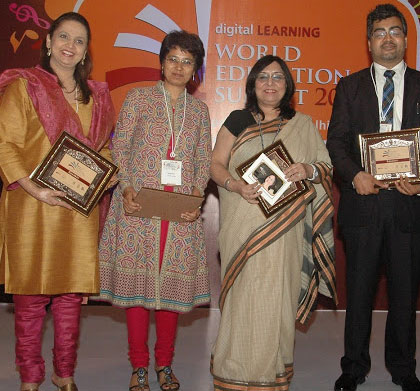
 I believe no matter howsoever marvellous the school curriculum is, the problem lies in its implementation. I have been involved in setting up early learning centres with the Shri Ram Group. We believe in not only imparting skills but an attitude. We work in a children-centric curriculum. We look into different aspects like emotional security, experiential learning to encourage inquiry among students, and differentiating between a slow and a fast learner. We also hold workshops for parents to bridge any sort of disconnect.
I believe no matter howsoever marvellous the school curriculum is, the problem lies in its implementation. I have been involved in setting up early learning centres with the Shri Ram Group. We believe in not only imparting skills but an attitude. We work in a children-centric curriculum. We look into different aspects like emotional security, experiential learning to encourage inquiry among students, and differentiating between a slow and a fast learner. We also hold workshops for parents to bridge any sort of disconnect. Emotional stability is important, as a child needs to be understood and heard. There shouldn’t be any ranking, neither in academics nor in sports. Our effort is to de-digitise, as too early stimulation will affect in the long run. Thus, computers should be limited as an aid. Treating parents as partners is extremely important. Also, teachers need to feel valued.
Emotional stability is important, as a child needs to be understood and heard. There shouldn’t be any ranking, neither in academics nor in sports. Our effort is to de-digitise, as too early stimulation will affect in the long run. Thus, computers should be limited as an aid. Treating parents as partners is extremely important. Also, teachers need to feel valued.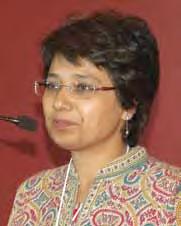 The role of educators is to keep the curiosity alive in the children to develop them fully. The key imperatives of early childhood educators to help children reach their goals are: Care, Curriculum, Curiosity, Confidence and Creativity. The art of asking questions rather than knowing the right answers is a major aspect of a child’s development.
The role of educators is to keep the curiosity alive in the children to develop them fully. The key imperatives of early childhood educators to help children reach their goals are: Care, Curriculum, Curiosity, Confidence and Creativity. The art of asking questions rather than knowing the right answers is a major aspect of a child’s development. We have realised that we cannot live in that idealist framework where you teach a moral science chapter on don’t lie and the kid goes back home and observes his/her parents lying. So we believe that parents should go many steps beyond PTMs, and not only in pre-primary classes but beyond that as well.Amol Arora, Vice Chairman & MD, Shemrock & Shemford Group of Schools, New Delhi
We have realised that we cannot live in that idealist framework where you teach a moral science chapter on don’t lie and the kid goes back home and observes his/her parents lying. So we believe that parents should go many steps beyond PTMs, and not only in pre-primary classes but beyond that as well.Amol Arora, Vice Chairman & MD, Shemrock & Shemford Group of Schools, New Delhi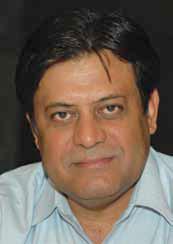 The issue here is not only about early childhood education (ECE). It is about early childhood care where emotional needs should be met. A school is a child’s first point of separation from his/her family. I think there is a lot of homework that needs to be done by most schools in that regard. ECE also needs to have measurable outcomes in terms of the ambience and the pedagogy.
The issue here is not only about early childhood education (ECE). It is about early childhood care where emotional needs should be met. A school is a child’s first point of separation from his/her family. I think there is a lot of homework that needs to be done by most schools in that regard. ECE also needs to have measurable outcomes in terms of the ambience and the pedagogy.











